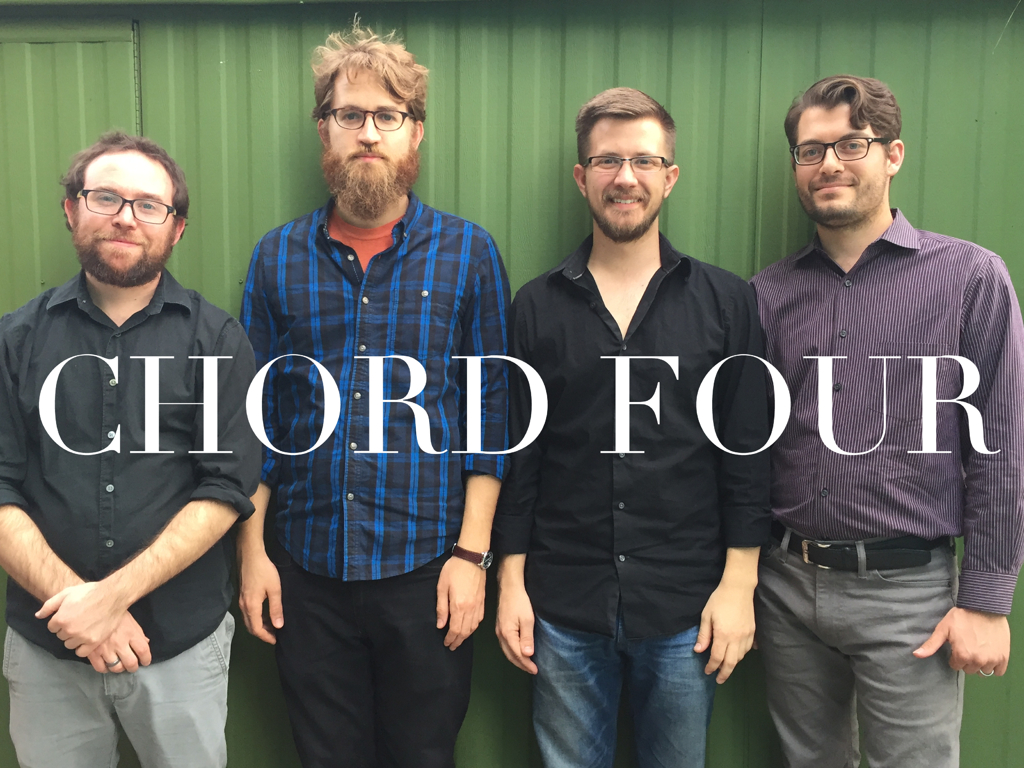CHORD FOUR
“[not] a slam dunk for Jazz Radio”
Brandon Sherman • Andrew Conrad • Colin Woodford • Emilio Terranova
“A really great band; really tight.”
“Your music really helped people pay attention to the colors in my work.”
Chord Four is a "California Avant-Garde" ensemble of improvisers and award-winning composers creating original music which strikes a careful balance between interesting rhythm and harmony. Conceived in 2008, this chord-less Los Angeles based ensemble has relentlessly built a 50+ song repertoire maturing their individual and group sound.
Heavily influenced by Jazz, as well as the traditional music of West Ghana, Indonesia, India and the Balkan region of Eastern Europe, their music is difficult to place into a specific genre. This along with their familiar yet unique instrumentation makes for a dependably intriguing collection of sounds and timbres.
“The creative energy and ensemble work generated by this collective is truly innovative and engaging. Its so wonderful to hear such fresh music played with vigor and total commitment to the moment.”
Chord Four is:
Andrew Conrad: Tenor Sax, Clarinet, Bass Clarinet, Melodica
Brandon Sherman: Trumpet, Flugelhorn, Melodica
Emilio Terranova: Double Bass
Colin Woodford: Drums, Cymbals, Melodica.
On their long-awaited second album, California Avant Garde, Chord Four makes the case for a West Coast perspective on the forward-looking music. In keeping with their home state’s sunnier disposition (not to mention their own love of clever wordplay, as evidenced in their song titles), Chord Four approaches the idea with tongues at least partly in cheek, though with a spirited interplay deepened by a decade of exploration together. The quartet – saxophonist Andrew Conrad, trumpeter Brandon Sherman, bassist Emilio Terranova, and drummer Colin Woodford – were all students together at California Institute of the Arts, where they discovered a shared array of disparate influences and a common musical purpose.
“The first time we played together, we realized how connected we all were musically and improvisationally,” Conrad recalls. “It was apparent that this was a fun combination and a really freeing group. We all feel like we can do whatever we want to do and act on what we each hear.” California Avant Garde, due out May 3, arrives more than eight years after the band’s self-titled debut; they’ve kept busy in the interim with a number of digital EPs and video releases while, most importantly, continuing to hone their wide-ranging and spontaneous sound live. In the summer of 2017 those efforts were awarded with first place honors in Italy’s Conad Jazz Contest, leading to a performance at the prestigious Umbria Jazz Festival.
Downbeat hailed the band’s performance, praising original compositions that “coalesced a global array of rhythms and out-of-the-box structures to facilitate fresh thinking on the improvisations, which, indeed, were consistently focused and creative."
The same accolades apply to California Avant Garde, which employs compositions that are challenging without being constrictive, like a labyrinth with countless exits. These zig-zagging pathways are built on rhythms that draw on a globe-spanning interest in musical traditions, learned directly from the source. The members of Chord Four have studied with master musicians from Africa, India, Indonesia, Eastern Europe and elsewhere, absorbing elements from each and applying them through their own perspectives without ever striving for an artificial “fusion.”
“It’s very different being taught a style of music by people from within that tradition,”Conrad says. A lot of the learning happens in a very different way than we’re used to in the western academic style. West African drumming, for instance, is heavily based on listening and reframing how you think music works, and that influenced us all to heavily rethink and reevaluate how we approach composition."
The very structure of California Avant Garde celebrates the band as a conglomerate of individuals. Over the course of the hour-long program, each member gets his turn in the spotlight with a brief solo improvisation (named for their instrument); at the end, all four join together for a brief improvisatory excursion, clocking in at under a minute but reveling in the sound of their collective voices.
That framing grew out of the band’s unique recording technique, which approached each day in the studio like a live performance, with several sets played straight through. “We found that method of recording leads to the most interesting performances, especially for this group,” Conrad explains. “It feels more like a live setting, where we’re comfortable and feel free rather than getting bogged down with the idea of getting a perfect take of one song.”
